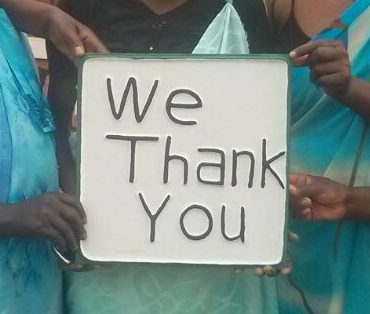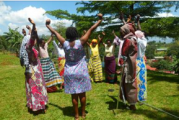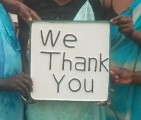
A group of mothers, victims of rape committed during the genocide, who have attended our community counselling programme, gave us a big surprise last week. They presented us with a thank you gift for the psychological support they have received and also told us about their initiative to create their own support group named ABURUKUNDO, which means “People with Love”, through which they will continue to meet and encourage each other.
One of the mothers said “Before attending the counselling groups I did not think I was worth anything, I used to go to church dirty and poorly dressed like I was going to the garden but after attending the groups I am now a smart and clean woman … some men are interested in me… (she laughs). Now I realise I have missed a lot of life and I cannot miss anymore”. She is now far more confident and positive about life.
Uwase Odette (not real name) was married before the genocide with four children. Her husband and three children were killed, she survived with one son. She was raped and gave birth to a boy so she now has two boys.

SURF works with Foundation Rwanda and local NGO partners (AVEGA, Kanyarwanda and Solace Ministries) to support women who were raped during the 1994 Rwandan genocide against the Tutsi and who have children born of rape. In response to the mothers’ request to receive help around how to disclose to their children, we and our partners established the community counselling initiative. With financial assistance from Dining for Women and a UK family charity, this initiative brings together groups of women facing similar situations, to offer support and a safe space to discuss their own experiences and trauma and their relationship with their child.
Facilitated by trained counsellors, community counselling mothers meet twice a month for 6 months in group sessions that involve creating group boundaries and building trust, discussing trauma and how to prevent a traumatic crisis, how trauma is expressed in young people, responsibilities of being a parent, child rights, adolescence, resolving family conflict and how to discuss with their child born of rape about their histories.
The results of the programme are astounding. Amongst others questions, women were asked how they rated their life (satisfaction) on a scale of 0 to 10, where 0 is the worst possible life one can imagine. At the start of the programme 89% of them rated their lives as 5 or below, with the most common response being 2. By the end of 12 sessions the same women were reporting a life satisfaction level of 8, with similar high levels around hope for the future and other markers. This demonstrates the incredible journey for these women in their overall confidence and self esteem and the power of community and collective work.
We receive the mothers’ gift with great humility and wish to dedicate it to all people with love – Aburukundo – that are the staff, partners, donors and, not least, the women themselves, who make these remarkable achievements possible. We hope, with your help, that we will be able to continue this programme and to reach out to greater numbers of women who have not yet received such invaluable support.

